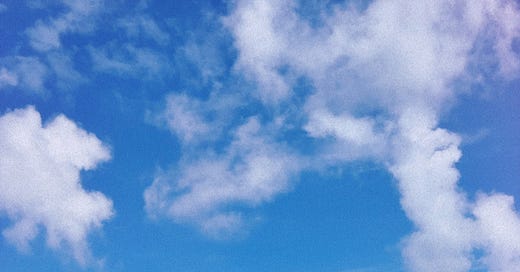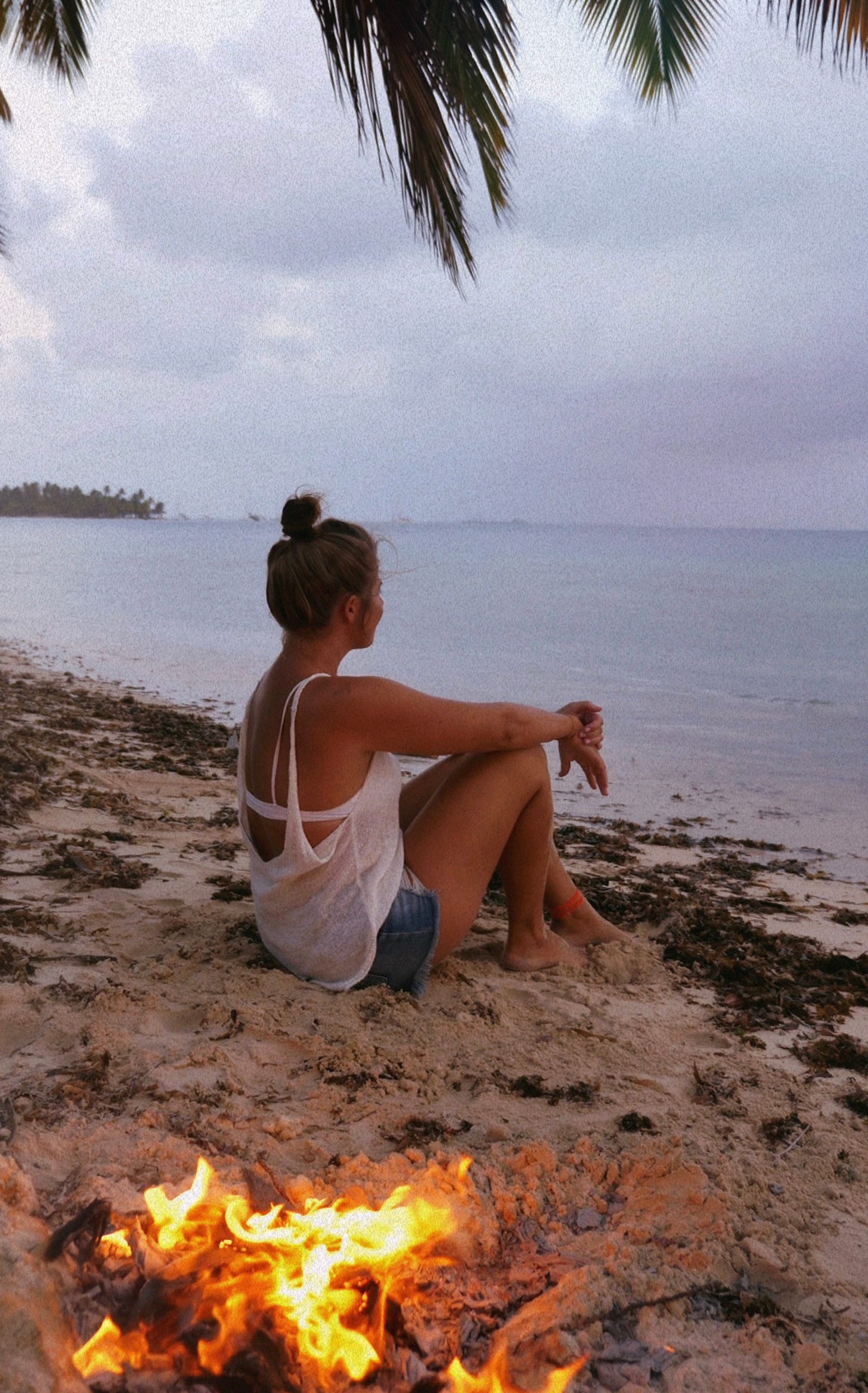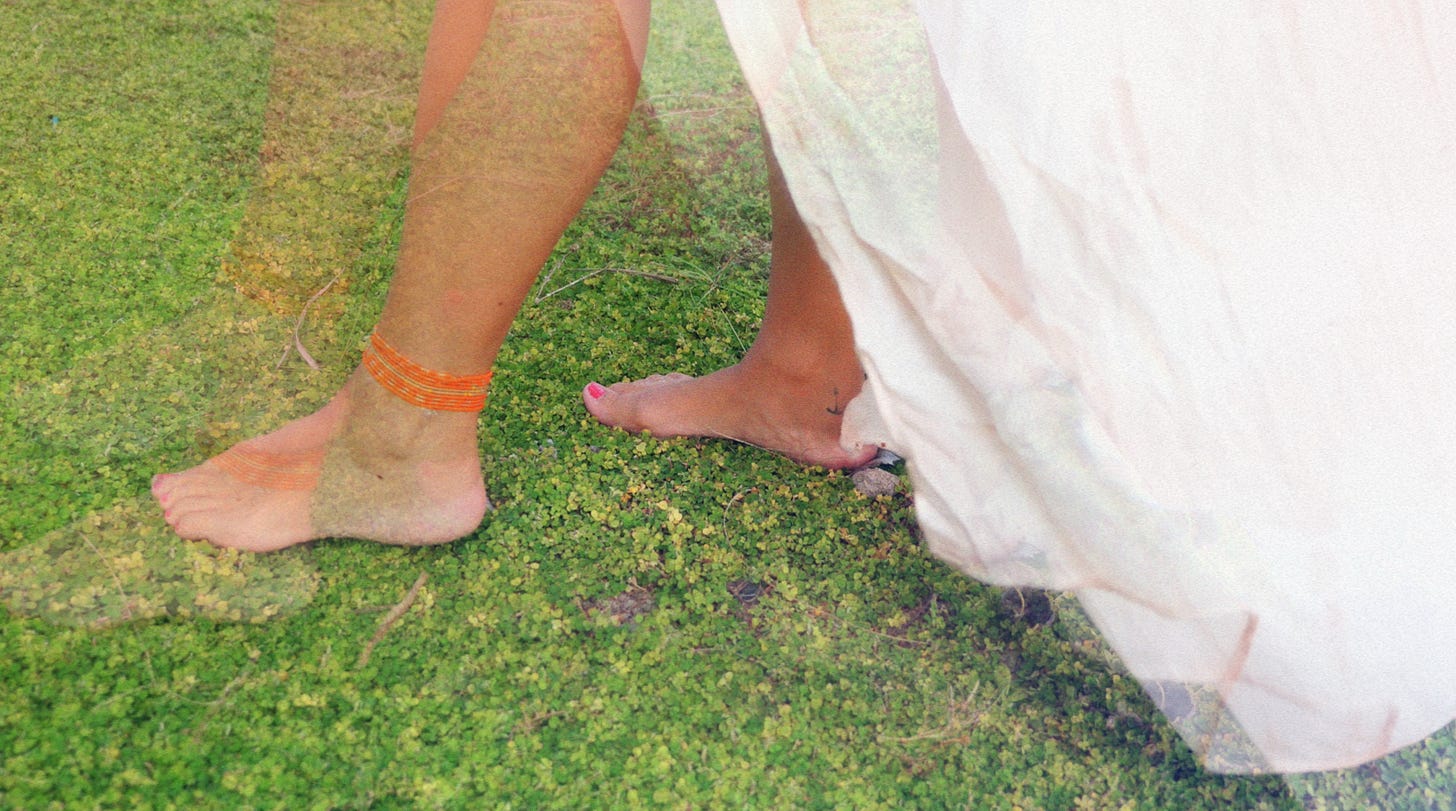The moon is overhead. I don’t really know what day of the week it is or what the date is or sometimes even what month or season it is, but I know the moon is waxing, about a quarter moon now, rising later and growing bigger every afternoon.
A soft background symphony of small waves lapping the white sand beach hushes along outside, against the more distant white noise of the wrath of the ocean crashing to a stop on the reef further out, which is all dampened slightly by the rattling of our seven fans that haven’t been shut off in months. My neighbor’s dog barks and gets lovingly shushed and I hear others laughing in the distance. The trade winds rush through the wide open window above and sweep around my face as I lie on my bed. It’s 7pm. We’ve already cooked and eaten and cleaned up, and it’s dark now, so we turn off the power, which takes the internet and the portal to the rest of the world with it. Now we’re just here, with the moon, with the sea, with the night.
We have been living in a remote archipelago for what is now approaching four months, in territory inhabited by the indigenous Guna people, far from the trappings of modern civilization. I haven’t seen a grocery store or washing machine or a restaurant or a car or a road or even a proper building in nearly four months. When the clothes and towels and sheets need to be cleaned, I do it by hand, or really by foot, stomping and swishing the fabrics around in our collapsable bucket like Lucy making wine. It requires many small loads and many hours, washing and hanging and turning everything over periodically in the Caribbean sun until it’s dry, or as dry as it can be with the sea hazily misting the air.
I haven’t worn shoes in four months, except once, when I slipped some sandals on for a few hours on the day we hiked high into the pristine rainforest on the mainland to jump off a cliff into the river, and then swam our way out, whooshing down little waterfalls and climbing on all fours over slippery rocks like kids on a playground, as the group of us chatted and slowly waded in the dappled sunlight until we arrived all the way back down to sea level. Truthfully though, the sandals felt bizarre on my feet, unwanted, like I was walking on mini trampolines, like there was too much plastic, too much of a barrier between me and the earth. I took them off as soon as possible and they haven’t been back on since.
We have to be careful to watch our power use, especially on the overcast days when our solar panels can’t see the sun and therefore can’t produce the energy we run our house on. We have to be careful of our water use, too, as we make all of our own freshwater with a machine that requires both power and time, turning the ocean water into drinking water, drop by drop. We must be mindful not to run out of cooking propane either, as we won’t be able to get more easily if we run out. And food, though we can (and do) arrange to have some delivered out to us from distant Panama City, is always being rationed and carefully eaten in order of its shelf life. When we go over to a friend’s house for dinner, everyone brings a dish to share, as well as their own cups, drinks, plates and silverware, and takes their own trash when they leave. Every resource we rely on, its origin, its impact, and its limit, is considered closely with every use.
I am rarely ever apart from my husband and our dogs, and when I am, it’s often so I can do some work and it’s never for more than an hour or two at most — and if I go on deck I can see them, just on the beach right over there, playing in the sand and surf. In the mornings, the Guna people who inhabit this region paddle over to each boat in their handmade canoes that have been carved out from a single tree trunk, selling fish or their hand-stitched molas with smiles and their trademark warmth, chatting through the many language barriers with people who have sailed here from all over the world, while they continuously bail out the few inches of sea water that seems to always creep into the bottom of their boats. They are part of an autonomous matriarchal society, living on the little lumps of these slowly sinking islands, in homes made of bamboo walls and palm frond roofs and packed sand floors, with a hammock or two in the corner for sleep.
I know everyone in most of the boats around me, having met in the previous years somewhere in California or Mexico, all of us traveling approximately the same way on our own journeys through the world’s oceans. We’ve known each other for some time now, but here, we’re beginning to really know each other, our social muscles perpetually getting flexed and stretched in ways that I, for one, haven’t experienced since college. Maybe it’s strange that it took being out in the middle of nowhere to find so much company, but maybe it’s because finding another person here, anywhere, along the way, doing this weird thing too, seems like an occasion, something to celebrate with a hello. Back on land strangers are mostly inconveniences, people jamming up the roads or making us late somewhere or getting in our way — them — but out here, in the vast and mostly empty ocean, strangers are us, friends, exciting and welcome company, and as such, our community is constantly growing. It’s like the absence of physical buildings and roads asked us to form our structure around people, instead.
It is a community, but one that carries a more primal valence than any community I have ever been part of before. “Community” on land was often more of a shared interest that we would all show up for and enjoy before all returning back to our individual and separate lives. But out here, there’s a sense that we are all an integral part of some small nomadic village, and though we vary in age and come from different backgrounds, countries, careers, and beliefs, we operate as a tribe, pooling our knowledge and resources and doing nearly everything together. We navigate together, we travel together, we study the weather together, we hunt together, we eat together, we ride out storms together, we explore the reefs and swim and play together, we celebrate milestones together, we sit around the bonfire together. We share everything, from tools to spare boat parts to medicine to pantry items and food. Instead of shopping we exchange clothing. We watch out for each other. Should anyone have trouble for any reason (illness, broken systems, etc), everyone lends what they can and no one goes anywhere until it’s tended to, or until we can all move together. There’s a happy reliance, almost an unspoken emotional and material dependance on each other that American individualism would surely judge weak or wrong, but that our cells and nervous systems somehow recognize as vital, something our ancient, animal humanness longs for and reveres.
Out here, currency is a can of beer, entertainment is the sharks that occasionally circle our house, time is the angle of the sun, work is done around the tide and weather’s schedule, and sunsets are ceremony — every night, the busyness stops and attention is turned to the coral toned sky that casts us and the earth and the sea and the birds all in the same golden glow.
We occasionally reminisce about how good cheeseburgers or were, or the luxury of restaurants and food made by someone else that just gets handed to you, or we laugh at how insane Amazon prime is, or really any other version of how nice it was when we would just be to be able to just… get that thing that you wanted, right now. We recall what it was like to just walk to a store or never think about running out of water or cooking gas or power or food — the things we all remember from life on land.
We have lived on a sailboat and traveled to many remote places for the last three and a half years now, but there’s been something particularly powerful about these last four months— living this far away from modern civilization for this long has been the education I never knew I needed.
Sometimes, instead of being present with something or someone I love, I think about how much I am going to miss it when it’s over. I imagine my future self looking back on this moment, wishing it was still here, that I was still there, and in some hopeful attempt to help strengthen this memory for my future self, I intently study every last detail in front of me now, like I’m preparing for a test, closely noting every shade and slant of light and shifting texture and scent and every feature available to experience, including the cumulative feeling tone of it all, and I store it away somewhere in my nervous system, trying to breathe a moment so deep into my bones that it can never leave.
Sometimes this takes me farther away from here — off in this imaginary world of some future time where everything is different and this good thing is gone and I’m in some other place, some other moment, where everything has surely changed in ways I can’t even presume to see from here. But sometimes this awareness of things only being good because they end, combines with this devoted, piercing attention to the minutia of what I cherish, and it seems to turn my senses ultrasonic — and it feels as though if I were tested, I would ace it, I could remember every element of this moment in it’s fullness. I don’t know if this is true. But I hope it is.
Because someday, I may find myself a long ways from here, in more ways than one. And no, maybe I won’t miss the bugs that appear in our dry food, or the mold that grows on everything (everything!), and the way cuts never heal, and the nervous sleepless nights, and the countless other challenges of a life lived on the ocean, away from it all. But I hope that years or decades from now, I can remember where every freckle was on my husband’s tanned shoulders, or recollect how the heavy tropical air smelled exactly like clouds, or the precise neurotic way Penny sprinted in excited circles in the sand in utter uncontainable joy, or the specific eerie way the wind whistled and howls when it’s encountered nothing but flat open water for hundreds or thousands of miles, or the rhythmic glittering of the sea under the rising morning sun.
I hope I can fully remember what it feels like, in my body, to be synced to the moon and governed by the sky, attuned to the weather instead of the weekdays. I hope I can recall exactly what it feels like to be a human shaped by the wind and grown by the sun and softened by the water, to have the earthly elements be my companions and foes and all-consuming constant characters in the story of my life, instead of background noise, distant and blurry. I hope I can remember what it feels like to know that we really need nothing, but we also need everyone.
Some day, I may find myself back on land, and lost again in the lines of calendars and schedules and roads and the rigidly organized and structured grids of manmade modern life, and I hope if that happens, I can summon my studying and remember this moment, turn off the internet, go outside, watch the sun bow to the horizon, and take off my shoes — burying my bare soles firmly in the grit and mess of the actual ground, where they belong.
xo, Taylor
This has been a free and public post. Please feel free to share, screenshot, comment, like, or send to a friend. Thank you for reading.
You may also enjoy:












I love being barefoot. On the farm, I can't do so as much as I want. But every opportunity, boots go flying!
My favorite thing to do is vegetable garden barefoot. If your garden doesn't have barefoot soil, you're not doing it right! 😆✌️
Thank you Taylor. I really appreciate your studying of the present moment in such a remote environment on the ocean. I love that I shared many moments with you and that you represent them now in your writing so poetically.